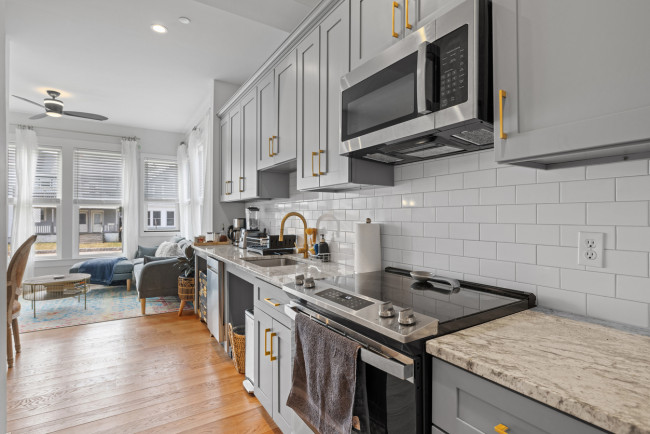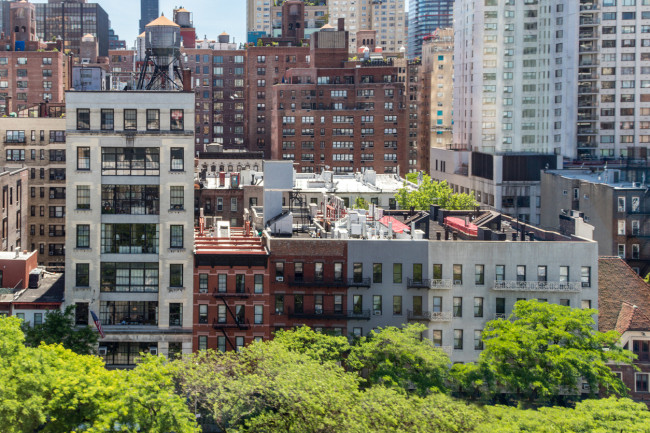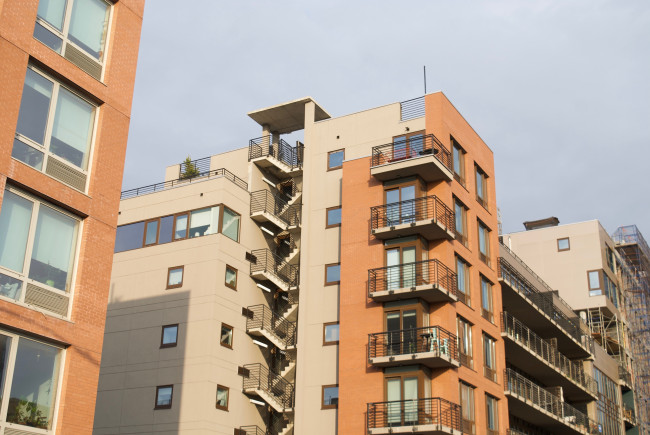What to look for when you're checking out a NYC rental apartment
- Ask about bedbugs, look out for tourists—a sign of short-term rentals
- A late-night visit can help you determine whether it's a noisy area

Try to see the apartment in person and look closely at conditions in the building when you visit.
iStock
In New York City, an apartment lease serves as a contract with your landlord—and an expensive one at that—so you need to make a thorough check of an apartment before you sign on the dotted line and hand over your security deposit.
One of the most important tips is to see the apartment in person. Video tours and pictures are useful but by physically spending some time in the apartment you’re able to tell if it’s a place you can commit to. Among the other suggestions for how to make sure the apartment is the right one for you: Do a late-night visit to check out the noise level and also do some research into the building’s bedbug history.
Read on for how to thoroughly check out a rental apartment in NYC.
To rent an apartment in New York City, most landlords require you to earn an annual salary of at least 40 to 45 times the monthly rent. If you don't—or if you’re an international employed person, self-employed, non-employed with assets, retired, or an international student or U.S. student—you’ll need to find a guarantor for your lease who earns at least 80 times the monthly rent and lives in New York, New Jersey, or Connecticut. Or you can turn to Insurent Lease Guaranty. Accepted at more than 4,700 buildings across the city representing over 475,000 apartments, Insurent Lease Guaranty is a quick and easy way to get the apartment you want. Click here to learn more.
1) Try to visit the apartment and see it in person
If you can, avoid renting a place if you haven’t physically gone to see it. Renting sight unseen puts you at risk of bait-and-switch scams—where you’re enticed with photos of one apartment but, once you get the lease, find it is for a different, substandard one.
If you use a virtual tour to check out apartments, make sure you are working with a reputable broker and cross-check the information you’re given. You can search for the location of the apartment as well as the landlord's name online and see if the place exists or there’s negative press about it. For more, read: “How to research a landlord before you sign a lease.”
If you were sold on a great view—go to the windows and check it out and make sure it matches what you are paying for. Conversely, closed window shades in a listing photo can often mean something not so nice lies beyond the window, so be curious.
Need help finding an apartment you love in one of the most competitive markets ever? Put your search into the capable hands of The Agency, a tech-savvy real estate brokerage founded by a pair of Yale grads in response to the frustrating apartment-search experiences of classmates and colleagues. The Agency will charge a broker's fee of 10 percent of a year's rent on open listings instead of the usual 12 to 15 percent if you sign up here. Bonus: The agents at The Agency are a delight to deal with.
2) See beyond the slick marketing of a new rental development
If you’re considering renting in a new luxury development, make sure you can separate reality from slick marketing. If you’re shown a model apartment, consider the quality of the finishes and materials. Think like a buyer—scrutinize the apartment as thoroughly as if you were buying it: Check the developer’s track record, consider whether there are enough electrical outlets and ask about soundproofing. If at all possible test it out yourself by bringing a friend and ask if they can visit the (empty) apartment above while you remain downstairs—they should stomp around so you can see if the noise travels.
Make sure an awkward layout hasn’t just been disguised by some savvy staging. One trick is to open everything—see if you can easily open doors to the refrigerator, cabinets, bedroom(s), and bath without issue. In tight, poorly designed spaces, sometimes opening one door blocks access elsewhere. And some developers take shortcuts by installing shallow kitchen drawers or closets, so look in there too.
3) Perform a late-night soundcheck
One tip to establish if there are any bars or restaurants that might pose a threat to your peace and quiet is to visit the building late at night (with a friend, if necessary). It might not be a deal breaker: Street noise can often be mitigated with some soundproofing but it’s worth knowing what you are getting into.
You should also check whether construction is coming to your block, which can be a pain if you’re working from home.
4) Know your bedbug rights
If you’ve never experienced bedbugs, you want to keep it that way. You are legally entitled to a written disclosure of the building's bedbug history when you sign a lease. To spare yourself a headache, ask about the building's history with bedbugs. You can't be sure you're going to get an honest answer, but it can't hurt to come across as aware and proactive.
Also check the Bedbug Registry as well as the NYC Department of Housing Preservation & Development website if you want to find out about ongoing infestation or poor management.
5) Determine whether the building is kid-friendly
Anti-housing discrimination laws prevent real estate agents from discussing whether a building is family friendly or not—or even whether local schools are good. If you’re looking for a place that’s family friendly, there will be clues in the size of the apartments and the amenities. If the building is largely composed of two-bedroom apartments that would work for families and there’s an attractive playroom, you may have found your match.
You can also speak to the doorman—maybe you’ll luck out with the best doorman ever—or visit the building before or after school to see if you notice families coming in or out of the building.
6) Watch for tourists coming or going
When you visit the building, keep an eye out for tourists with backpacks or rolling suitcases—a possible sign of illegal short-term rentals.
The city is trying a new approach to combat illegal short-term rentals, including a list of buildings that do not allow them. Ideally you would want your building to be on the list so you don't end up living next to the apartment that gets rented out for bachelorette trips to NYC. For more, read: “To combat illegal short-term rentals, NYC tries a new registration system for hosts. Here's how it works.”
7) Don’t assume management firms run all buildings the same way
If you’re switching to a new building managed by the same company, don’t assume the experience will be similar. Management companies don't always make the same renovations across their entire inventory. There could also be variations in staffing and cleanliness between buildings. In a super competitive rental market, it’s possible costly repairs have been postponed (even if you benefited from them being in place elsewhere in the landlord’s portfolio).
You Might Also Like































